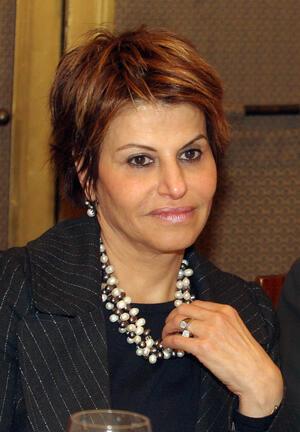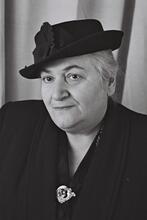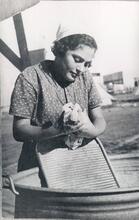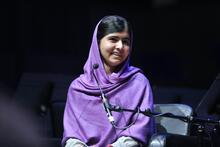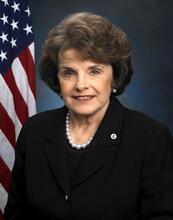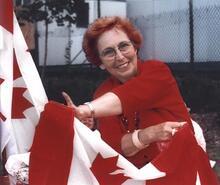Dalia Itzik
Israeli politician Dalia Itzig, 2007. From the Knesset Archive, via Wikimedia Commons.
Born in Jerusalem to Jewish immigrants from Iraq, Dalia Itzik rose from the lower-income neighborhood where she was raised to become the Speaker of the House in the Israeli Parliament. She was the first in her family to pursue higher education. Her early career began in the education system as a teacher, where she quickly advanced to the position of deputy principal. As an activist, it was a natural progression for her to enter local politics, serving as a council member and later as the deputy mayor of Jerusalem. Her political career progressed rapidly; in the 1992 elections, she was elected to the Knesset. Starting as a rank-and-file representative, she eventually became a committee chair and held ministerial positions in several ministries. In 2006, she was elected unanimously as the Speaker of the Knesset.
Family and Education
Dalia Itzik was born on October 20, 1952, in Jerusalem. Her parents, Gershon and Marcel Blass, were Lit. "Eastern." Jew from Arab or Muslim country.Mizrahi Jewish immigrants from Iraq who had arrived in Israel in 1949 with four adult children. Her father was ill, and her mother worked hard to support the family. Dalia's brothers did not finish high school, instead working to help support the household.
In 1972, Dalia met Dan Itzik they married eight months later. They have three children: Ran (b. 1975), Uri (b. in 1982), and Adi (b. 1985).
Itzik holds a bachelor's degree in history and literature from the Hebrew University and another bachelor's degree in law from the Interdisciplinary Center in Herzliya. In the early stages of her career, she worked in the public education system as a teacher. After two years, she was promoted to deputy principal. She was one of the founders of the Givat Gonen community school in Jerusalem, which operated under a unique model of reverse integration aimed at integrating the dominant group into the minority by cultivating graduates with a strong social, ethical, and environmental orientation. In 1982, Itzik was elected chair of the teachers' organization in Jerusalem, a position she held until 1989. In October 1988, she was involved in a serious car accident that resulted in multiple fractures in her body and face, temporarily postponing her public activities.
Election for the Local Municipality
In 1989, Itzik was invited by the Mayor of Jerusalem, Teddy Kollek, to run in the local municipal elections as part of his list. She agreed and was elected as a city council member, where she was responsible for education and culture. Shortly after her election, she was nominated as deputy mayor. Focusing on her main agenda of education, Itzik dedicated her time and effort to improving the school system. She promoted the implementation of a longer school day, especially for young pupils, and worked to integrate older immigrants from the Soviet Union and Ethiopia into the education system as teachers. Additionally, she fought for equal funding for all schools. During her tenure, the education budget for Jerusalem increased significantly.
Election to the Knesset
After three years on the Jerusalem city council, Itzik was elected to the Lit. "assembly." The 120-member parliament of the State of Israel.Knesset as a representative of the Labor Party in the 1992 elections, marking the beginning of her long service in the Israeli parliament. Over the course of her career, Itzik initiated numerous bills focused on promoting gender equality and educational issues. For instance, she was instrumental in establishing a law that increased women's representation on government inquiry committees and State Commissions of Inquiry. In 1998, she was one of the key figures behind the Law to Prevent Sexual Harassment, which marked the first time the term "sexual harassment" was officially included in Israeli legislation. Compared to other countries, Israel is considered to have strict laws against sexual harassment. Itzik also successfully promoted an amendment to the Women's Equal Rights Law, ensuring that the principle of gender equality is applied across all areas of life. She initiated an amendment to the state education law that established specific goals for education, including respect for human rights and civil rights and the promotion of tolerance and peace. Another significant achievement was legislation that extended maternity leave.
Dalia Itzik advanced from a rank-and-file MK (Member of Knesset) to the chair of the education committee, based on her early experiences in the education system and local government. Subsequently, she became the first chair of the Committee on Research and Development in Science and Technology; under her leadership, this committee became permanent. In both committees, she worked to advance initiatives and laws that benefited the greater good, with a particular focus on supporting lower-income individuals. Her agenda aimed to dismantle the obstacles faced by poor and working-class people in their daily lives.
Ministerial Career
In July 1999, following the formation of the 28th Government, Itzik was appointed Minister of the Environment. During her tenure, she established a "green police," collaborating with the regular police and the civil guard to enhance enforcement in areas related to cleanliness, noise pollution, and animal protection. Additionally, she expedited the efforts of the seawater desalination team. In 2001, with the establishment of the 29th Government, Itzik was appointed Minister of Trade and Industry, making her the first woman to hold this position. During her time in the ministry, she launched a campaign promoting domestic products. In 2005, she was appointed Minister of Communications, serving in this role for less than a year; during her brief time in office, she worked to promote competition within the communications market.
In November 2005, Itzik left the Labor party and joined the Kadima party, along with several other Labor MKs. Kadima was a centrist and liberal political party in Israel, established on November 24, 2005. It was founded by moderates from the Likud party, largely in response to the implementation of Ariel Sharon's unilateral plan of disengagement from Gaza in August 2005. The party was soon joined by like-minded politicians from the Labor party.
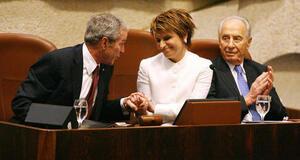
(From left) President George W. Bush, Knesset Speaker Dalia Itzik, and President Shimon Peres at the Knesset in 2008. Image courtesy of whitehouse.gov.
In 2006, at the beginning of the 17th Knesset, Itzik was unanimously elected Speaker of the House, the highest position in the parliament. To date, she is the only woman to hold this position. In her first speech as Speaker, she highlighted the significance of the moment, reflecting on her journey from a poor neighborhood in Jerusalem to sitting in the chair once occupied by the founders of Israeli democracy. She declared that her main mission as Speaker was to restore public trust in the Knesset, which has consistently been low. She promised to serve as a nonpartisan leader, committed to listening, hearing, and providing space for all voices in the Knesset. She concluded her speech with her favorite Jewish prayer: "May the One who makes peace in the heavens bring peace upon us and all the people of Israel, and we will say: Amen."
In 2007, during the 17th Knesset, the President of Israel, Moshe Katsav, was unable to fulfill his duties due to an indictment for sexual offenses. By law, the Speaker of the Knesset assumes the role of acting president, so Itzik served as acting President of Israel for two weeks in July 2007, until Shimon Peres was sworn in as President, making her the first and only woman to hold this position to date. In the 18th Knesset, Itzik served as the chair of the Kadima faction. Prior to the elections for the 19th Knesset, she announced her intention to leave political life.
Later Life
After retiring from political life, Dalia Itzik joined the boards of directors of several non-governmental organizations. In 2014, she ran for the presidency but did not advance to the second round. In 2020 she received the New Pioneers award from the Union Sefaradi Mundial (World Sephardi Union) for her contributions to the Israeli society.
Ben Arie, Shavit. Members of Knesset: Leading Women in Israel. Tel Aviv: Media 10 Publishers, 2011.
Itzik, Dalia, the Knesset web site. https://m.knesset.gov.il/mk/Apps/mk/mk-personal-details/8
Fox, Nina. “Dalia Itzik appointed Chairwoman of the Board of Directors of Hadassah Hospital.” Ynet, March 25, 2021; https://www.ynet.co.il/health/article/HkvTrg9Ed
Meltzer, Yoram. “Acting President.” Haaretz, June 7, 2007; https://www.haaretz.co.il/literature/2007-06-07/ty-article/0000017f-f6d4-ddde-abff-fef52a810000

